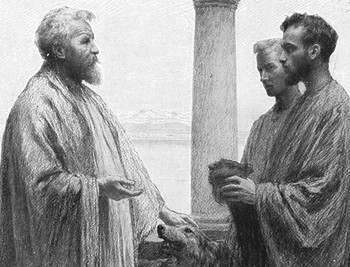Discipleship is an interplay of gift and response. It is not simply a focus on social justice but on the unexpected generosity of God, who gifts whom he will and when he will. Discipleship is never earned, only given. All that is asked of the one called is a response, however and whenever the call comes. And the secret to success in the Christian life is sharing Christ's dream with and among his people.
 We are His people – and we are called to bring His healing touch to all we meet, as only we can. We carry on his ministry in the world of today. We do what Christ did, We preach the Good News of the Kingdom. We heal the sick. We forgive the sinner. We spend time alone with God in prayer. We serve in his vineyard. We are his hands and his feet - and everything we do, we do in his name.
We are His people – and we are called to bring His healing touch to all we meet, as only we can. We carry on his ministry in the world of today. We do what Christ did, We preach the Good News of the Kingdom. We heal the sick. We forgive the sinner. We spend time alone with God in prayer. We serve in his vineyard. We are his hands and his feet - and everything we do, we do in his name.
And then we come to this parable. Suddenly we are faced with a very real possibility - one which scrambles up our small-world, our proper religion and our expectations of how we, the chosen followers, expect to be treated in this world and the next. We thought we knew the rules about how to succeed in the system, but this parable seems to throw the cards up in the air to fall wherever. Or, to put it another way, if this parable is true, the ground beneath our feet is not as secure as we once thought.
And to make matters worse, the parable is not an exception to the rule. If it were, we could just skip over it. But Jesus introduces the parable by saying it depicts how things are with God and how God works. “The kingdom of heaven is like….” The parable says, in its own way, what Jesus has said throughout the whole gospel. In fact, immediately following today’s parable he tells his disciples, “The last will be first and the first will be last.” The parable certainly illustrates what Jesus has done from the beginning of his public ministry.
This has much to teach us about God and about ourselves. The heroes of the parable are not the laborers but rather the vineyard owner. He is a stand-in image for God, and the good news of the Gospel is that we have been blessed by the extreme generosity of the Spirit of God.
But again, this rudely upsets our picture of God and our idea of what's fair and what's not. It reflects the words of the prophet Isaiah and speaks for a God whose “thoughts are not your thoughts,” nor are God’s ways our ways. It tells us that our human standards are useless in measuring God or attempting to understand Him.
God cannot work in this world other than by compassion and grace. The God of this parable is a “full- time, all-day worker,” who is always calling us to further change, always sending us to some section of the vineyard where our presence and labors are needed. The parable has but one purpose, to teach us about the nature of God's love. All other lessons are not as important to the story as that one.
[Image: The Talents by Eugène Burnand]





